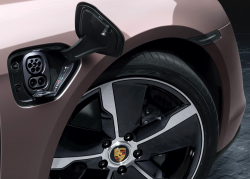
—
Porsche has filed a motion to compel arbitration in a Taycan battery fire class action lawsuit that was filed after a Porsche battery recall.
According to the class action, these model year 2020-2024 vehicles are defective due to the 800-volt lithium-ion batteries:
Porsche Taycan, Taycan 4S, Taycan Turbo S, Taycan 4 Cross Turismo, Taycan 4S Cross Turismo, Taycan S Cross Turismo, Taycan GTS, Taycan GTS Sport Turismo, Taycan Turbo S Cross Turismo, Taycan Turbo Cross Turismo and Porsche Taycan Turbo
In October 2024, an expanded Porsche Taycan battery fire recall was announced for 2020-2024 SUVs, but that recall followed an earlier Taycan battery fire recall in March 2024. However, Porsche had also recalled certain Taycans in 2023 due to high voltage battery fires.
The class action alleges the battery fire recalls failed and Taycan owners are still in danger. Owners allegedly overpaid for SUVs that are defective and dangerous to drive. Taycan owners also supposedly cannot sell their vehicles for what they should be worth due to the risk of battery fires.
According to the class action lawsuit, Porsche should replace all the Taycan high voltage batteries with non-defective batteries, or the automaker should repurchase the Taycans from customers.
The lawsuit also wants Porsche Taycan customers reimbursed for all losses related to the risk of battery fires.
Porsche Taycan Battery Fire Class Action — Motion to Compel
Porsche had already filed a motion to dismiss the Taycan class action, but now documents have been filed with the court which say claims from certain plaintiffs should not even be in court.
There were five plaintiffs named in the lawsuit when Porsche filed its motion to dismiss the class action. But according to the automaker, four plaintiffs signed arbitration agreements which allegedly prevent their claims from the ears of a federal court judge.
Those plaintiffs allegedly entered valid arbitration agreements when they purchased their Taycans. Those agreements say the plaintiffs must arbitrate, not litigate, their claims against Porsche.
Porsche further argues two plaintiffs signed binding arbitration agreements which “contain clauses delegating questions of arbitrability to the arbitrator (i.e., delegation clauses).”
“Because these agreements contain delegation provisions, the arbitrator—and not the Court—must decide whether PCNA may enforce them as a non-signatory in the first instance.” — Porsche
Porsche provided the judge copies of the agreements allegedly signed by the Taycan customers.
Porsche Taycan Arbitration Agreement
“Purchaser hereby agrees that all claims, disputes or controversies arising from or relating to the sale or servicing of the motor vehicle purchased hereunder, and any related goods or services, will be resolved by binding arbitration. Purchaser understands that by entering into this arbitration agreement, purchaser gives up his or her right to have claims, disputes or controversies decided in court.”
And that agreement specifically mentions class action lawsuits.
“Further, purchaser shall be barred from pursuing class action claims or class-wide arbitration claims. A neutral arbitrator, not by a judge or a jury, will decide the rights of the parties. The parties hereto have chosen binding arbitration in order to expedite resolution of any claims and to minimize the expense to the parties. Dealer will provide purchaser with a supplemental statement regarding arbitration procedures upon request.”
According to Porsche, the claims should be paused while certain plaintiffs are sent to arbitration.
The Porsche Taycan battery fire class action lawsuit was filed in the U.S. District Court for the Northern District of Georgia (Atlanta Division): Miodrag Kukrika v. Porsche Cars N.A., Inc.
The plaintiff is represented by Caplan Cobb LLC, and Gibbs Law Group LLP.

